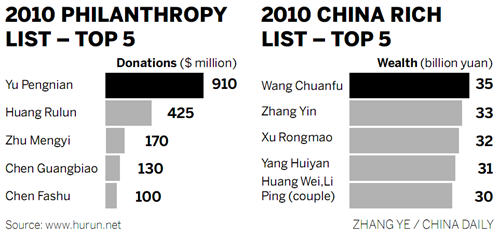Companies
One man's sermon to executives
By Chen Weihua (China Daily)
Updated: 2010-08-26 10:12
 |
Large Medium Small |
 |
For years, many Chinese entrepreneurs have been accused of improving their businesses at the cost of environment safety, exploiting cheap labor and taking advantage of loopholes in the country's inadequate legal system and even brazenly violating the law.
Shoddy goods and contaminated foods have caused people to lose confidence in Chinese businesses and products.
"Those who benefit substantively from China's economic rise should start to shoulder more responsibility for the environment and labor welfare, and they should be more grateful to society and become better corporate citizens," said Xiang.
"A gentleman needs to make money and use money in the right way."
These words from Confucius were also used by Hong Kong tycoon Li Ka-shing earlier this month when he pledged to donate more in the next 10 years than he has in the last 30 years.
Xiang said he wants to see Chinese businesses move up the chain from price competition to value competition.
"This can be achieved through innovation such as in products, processes, organization, technology, financing, distribution of resources and a new way of thinking," he said.
Xiang is critical of the fact that some Chinese businesses seem to have only one dream: To expand in size and to get rich quickly.
"We should have a diversity of dreams," said Xiang, who told the story of a 260-year-old Japanese restaurant in Kyoto that still operates only a single location after nine generations of operation.
Xiang, who first visited Japan in 1982 with a Chinese university student delegation, marvels at the Japanese attention to detail and pursuit of precision, something he believes Chinese may not be capable of learning given the fickle psyche of Chinese people these days.
He feels disappointed when business executives discuss speculative stock and property markets as favorite topics at gatherings, even when these sectors are totally irrelevant to their core businesses.
"We might have been a bit too hasty in the past and we may need to make some major adjustments in our psyche to have a more balanced and healthier model of development," said Xiang.
|
||||
"These classes teach students to think about the meaning of life. We want our students to live enriched lives, not just be happy or to become instruments for creating value for shareholders," said Xiang, who often writes about this holistic viewpoint.
Xiang believes the Chinese entrepreneurs will encounter great difficulties one day if they don't pay attention to values. "For China to become a valued member of the global community, we need to find ways to contribute to the development of values that match the economic contributions China is bringing to the global economy," he said.
"The biggest challenges for Chinese companies may not really be about technology and management. It is about sharing values and value integration," said Xiang.


